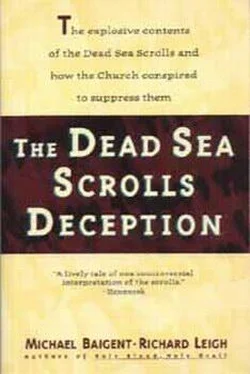A few days later, however, he again runs foul of those ‘zealous for the Law’, who are rather less temperate than James. On being seen at the Temple, he is attacked by a crowd of the pious. ‘This’, they claim in their anger, ‘is the man who preaches to everyone everywhere… against the Law’ (Acts 21:28ff). A riot ensues, and Paul is dragged out of the Temple, his life in danger. In the nick of time, he is rescued by a Roman officer who, having been told of the disturbance, appears with an entourage of soldiers. Paul is arrested and put in chains — on the initial assumption, apparently, that he is a leader of the Sicarii, the Zealot terrorist cadre.
At this point, the narrative becomes increasingly confused, and one can only suspect that parts of it have been altered or expurgated. According to the existing text, Paul, before the Romans can trundle him off, protests that he is a Jew of Tarsus and asks permission to address the crowd who had just been trying to lynch him. Weirdly enough, the Romans allow him to do so. Paul then expatiates on his Pharisaic training under Gamaliel (a famous teacher of the time), on his initial hostility towards the ‘early Church’, on his role in the death of Stephen, on his subsequent conversion. All of this — or perhaps only a part of it, though one cannot be certain which part — provokes the crowd to new ire. ‘Rid the earth of this man!’ they cry. ‘He is not fit to live!’ (Acts 22:22)
Ignoring these appeals, the Romans carry Paul off to ‘the fortress’ — presumably the Antonia fortress, the Roman military and administrative headquarters. Here, they intend to interrogate him under torture. Interrogate him for what? To determine why he provokes such hostility, according to Acts. Yet Paul has already made his position clear in public — unless there are elements of his speech that, in a fashion not made clear by the text, the Romans deemed dangerous or subversive. In any case, torture, by Roman law, could not be exercised on any individual possessing full and official Roman citizenship — which Paul, having been born of a wealthy family in Tarsus, conveniently does. Invoking this immunity, he escapes torture, but remains incarcerated.
In the meantime, a group of angry Jews, forty or more in number, meet in secret. They vow not to eat or drink until they have brought about Paul’s death. The sheer intensity and ferocity of this antipathy is worth noting. One does not expect such animosity — not to say such a preparedness for violence — from ‘ordinary’ Pharisees and Sadducees. Those who display it are obviously ‘zealous for the Law’. But the only such passionate adherents of the Law in Palestine at the time were those whose sacred texts came subsequently to light at Qumran. Thus, for example, Eisenman calls attention to a pivotal passage in the ‘Damascus Document’ which declares of a man that ‘if he transgresses after swearing to return to the Law of Moses with a whole heart and soul, then retribution shall be exacted from him’. 11
How can the violent action contemplated against Paul be reconciled with the later popular image, put forward by the consensus, of placid, ascetic, quietist Essenes? The clandestine conclave, the fervent vow to eradicate Paul — these are more characteristic of the militant Zealots and their special assassination units, the dreaded Sicarii. Here again there is an insistent suggestion that the Zealots on the one hand, and the ‘zealous for the Law’ at Qumran on the other, were one and the same.
Whoever they are, the would-be assassins, according to Acts, are thwarted by the sudden and opportune appearance of Paul’s hitherto unmentioned nephew, who somehow learns of their plot. This relative, of whom we know nothing more, informs both Paul and the Romans. That night, Paul is removed, for his own safety, from Jerusalem. He is removed with an escort of 470 troops — 200 infantry under the command of two centurions, 200 spearmen and 70 cavalry! 12He is taken to Caesarea, the Roman capital of Judaea, where he appears before the governor and Rome’s puppet king, Agrippa. As a Roman citizen, however, Paul has a right to have his case heard in Rome, and he invokes this right. As a result, he is sent to Rome, ostensibly for trial. There is no indication of what he will be tried for.
After recounting his adventures on the journey — including a shipwreck — Acts ends. Or, rather, it breaks off, as if the author were interrupted in his work, or as if someone had removed the original ending and inserted a perfunctory finale instead. There are, of course, numerous later traditions — that Paul was imprisoned, that he obtained a personal audience with the emperor, that he was freed and went to Spain, that Nero ordered his execution, that he encountered Peter in Rome (or in prison in Rome), that he and Peter were executed together. But neither in Acts nor in any other reliable document is there a basis for any of these stories. Perhaps the original ending of Acts was indeed excised or altered. Perhaps Luke, the author, simply did not know ‘what happened next’ and, not being concerned with aesthetic symmetry, simply allowed himself to conclude lamely. Or perhaps, as Eisenman has suggested — and this possibility will be considered later — Luke did know, but deliberately cut short his narrative (or was cut short by later editors) in order to conceal his knowledge.
The last sections of Acts — from the riot inspired in the Temple on — are muddled, confused and riddled with unanswered questions. Elsewhere, however, Acts is ostensibly simple enough. On one level, there is the narrative of Paul’s conversion and subsequent adventures. But behind this account looms a chronicle of increasing friction between two factions within the original community in Jerusalem, the ‘early Church’. One of these factions consists of ‘hardliners’, who echo the teachings of Qumranic texts and insist on rigorous observance of the Law. The other, exemplified by Paul and his immediate supporters, want to relax the Law and, by making it easier for people to join the congregation, to increase the number of new recruits. The ‘hardliners’ are less concerned with numbers than with doctrinal purity, and seem to have only a cursory interest in events or developments outside Palestine; nor do they display any desire for an accommodation with Rome. Paul, on the other hand, is prepared to dispense with doctrinal purity. His primary objective is to disseminate his message as widely as possible and to assemble the largest possible body of adherents. In order to attain this objective, he goes out of his way to avoid antagonising the authorities and is perfectly willing to come to an accommodation with Rome, even to curry favour.
The ‘early Church’, then, as it appears in Acts, is rent by incipient schism, the instigator of which is Paul. Paul’s chief adversary is the enigmatic figure of James, ‘the Lord’s brother’. It is clear that James is the acknowledged leader of the community in Jerusalem that becomes known to later tradition as the ‘early Church’. 13For the most part, James comes across as a ‘hardliner’, though he does — if Acts is to be believed — display a willingness to compromise on certain points. All the evidence suggests, however, that even this modest flexibility reflects some licence on the part of the author of Acts. James could not, obviously, have been excised from the narrative — his role, presumably, would have been too well-known. In consequence, he could only be played down somewhat, and portrayed as a conciliatory figure — a figure occupying a position somewhere between Paul and the extreme ‘hardliners’.
In any case, the ‘sub-text’ of Acts reduces itself to a clash between two powerful personalities, James and Paul. Eisenman has demonstrated that James emerges as the custodian of the original body of teachings, the exponent of doctrinal purity and rigorous adherence to the Law. The last thing he would have had in mind was founding a ‘new religion’. Paul is doing precisely that. Paul’s Jesus is a full-fledged god, whose biography, miracle for miracle, comes to match those of the rival deities with whom he is competing for devotees — one sells gods, after all, on the same marketing principles that obtain for soap or pet food. By James’s standards — indeed, by the standards of any devout Jew — this, of course, is blasphemy and apostasy. Given the passions roused by such issues, the rift between James and Paul would hardly have been confined, as Acts suggests it was, to the level of civilised debate. It would have generated the kind of murderous hostility that surfaces at the end of the narrative.
Читать дальше












